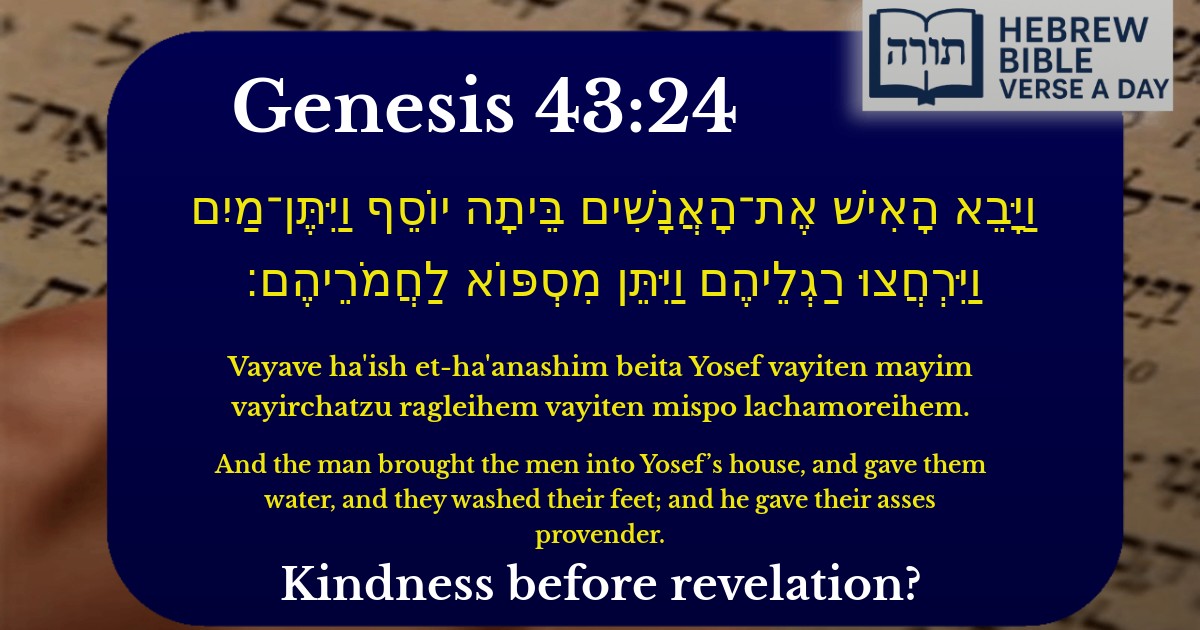Join Our Newsletter To Be Informed When New Videos Are Posted
Join the thousands of fellow Studends who rely on our videos to learn how to read the bible in Hebrew for free!
Hebrew Text
וַיָּבֵא הָאִישׁ אֶת־הָאֲנָשִׁים בֵּיתָה יוֹסֵף וַיִּתֶּן־מַיִם וַיִּרְחֲצוּ רַגְלֵיהֶם וַיִּתֵּן מִסְפּוֹא לַחֲמֹרֵיהֶם׃
English Translation
And the man brought the men into Yosef’s house, and gave them water, and they washed their feet; and he gave their asses provender.
Transliteration
Vayave ha'ish et-ha'anashim beita Yosef vayiten mayim vayirchatzu ragleihem vayiten mispo lachamoreihem.
Hebrew Leining Text
וַיָּבֵ֥א הָאִ֛ישׁ אֶת־הָאֲנָשִׁ֖ים בֵּ֣יתָה יוֹסֵ֑ף וַיִּתֶּן־מַ֙יִם֙ וַיִּרְחֲצ֣וּ רַגְלֵיהֶ֔ם וַיִּתֵּ֥ן מִסְפּ֖וֹא לַחֲמֹֽרֵיהֶֽם׃
וַיָּבֵ֥א הָאִ֛ישׁ אֶת־הָאֲנָשִׁ֖ים בֵּ֣יתָה יוֹסֵ֑ף וַיִּתֶּן־מַ֙יִם֙ וַיִּרְחֲצ֣וּ רַגְלֵיהֶ֔ם וַיִּתֵּ֥ן מִסְפּ֖וֹא לַחֲמֹֽרֵיהֶֽם׃
🎵 Listen to leining
Parasha Commentary
📚 Talmud Citations
This verse is not quoted in the Talmud.


Context of the Verse
This verse (Bereshit 43:24) describes the actions of Yosef's steward (הָאִישׁ) when Yosef's brothers arrive in Egypt for the second time. The steward brings them into Yosef's house, provides water for washing their feet, and feeds their donkeys. This occurs after the brothers had returned to Egypt with Binyamin, fulfilling Yosef's earlier condition.
Rashi's Explanation
Rashi (Rabbi Shlomo Yitzchaki) comments on the phrase "וַיִּרְחֲצוּ רַגְלֵיהֶם" ("and they washed their feet") by noting that this was a common practice in that region due to the prevalence of idolatry. People would worship by bowing to the dust, so washing one's feet upon entering a home was a way to demonstrate that they were not bringing any remnants of idol worship into a Jewish household. This aligns with the Torah's prohibition against any association with avodah zarah (idolatry).
Rambam's Perspective
Rambam (Maimonides) in Hilchot Avodat Kochavim (Laws of Idolatry) emphasizes the importance of distancing oneself from practices associated with idol worship. The act of washing feet, as described here, can be seen as a precautionary measure to avoid even the appearance of engaging in or condoning idolatrous customs.
Midrashic Insights
The Midrash (Bereshit Rabbah 92:5) elaborates on the steward's actions, suggesting that the phrase "וַיִּתֶּן־מַיִם" ("and he gave water") alludes to more than just physical water. It symbolizes the Torah, which is often compared to water in Jewish thought (as in Isaiah 55:1, "הוֹי כָּל־צָמֵא לְכוּ לַמַּיִם"). The steward's hospitality reflects Yosef's broader role in sustaining his family both physically and spiritually during the famine.
Symbolism of Feeding the Donkeys
The phrase "וַיִּתֵּן מִסְפּוֹא לַחֲמֹרֵיהֶם" ("and he gave their donkeys provender") is interpreted by Chazal as an act of chessed (kindness) that extends even to animals. The Talmud (Bava Metzia 32b) derives from this that one must feed their animals before eating themselves, based on the principle of tza'ar ba'alei chayim (preventing suffering to animals). This highlights the Torah's emphasis on compassion for all creatures.
Yosef's Hidden Identity
Malbim (Rabbi Meir Leibush ben Yechiel Michel) notes that the steward's actions mirror Yosef's own hidden identity—just as the brothers do not yet recognize Yosef, the steward's kindness foreshadows Yosef's eventual revelation and forgiveness. The meticulous care shown to the brothers (and their animals) hints at Yosef's underlying love for his family, despite the tension between them.